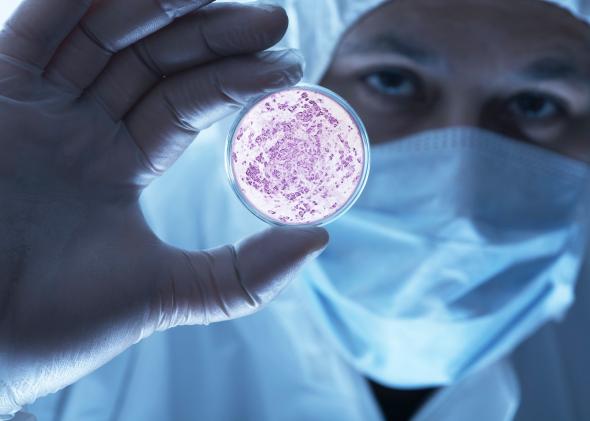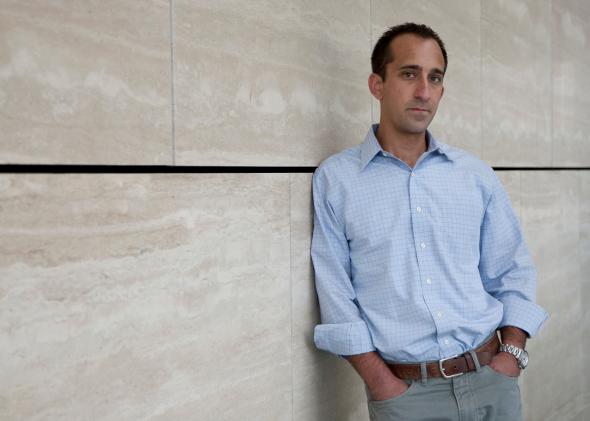The Next Frontier of Medicine
Following your gut takes on a whole new meaning as scientists find relationships between the brain and gut bacteria.

Thinkstock
The next frontier of medicine isn’t
in the depths of an Amazon jungle or in an air-conditioned lab; it’s in
the rich and mysterious bacterial swamp of your gut. Long viewed as an
enemy within, bacteria in the body have been subjected to a century-long
war in which antibiotics have been the medical weapon of choice. But
today, the scientific consensus about our body’s relationship with the
trillions of microbes that call it home—collectively known as the
microbiome—is changing dramatically. From potentially shaping our
personalities to fighting obesity, the bacteria in our bellies play a
much stronger role in our overall health than we once thought.
Developments in sequencing technology in the last decade have allowed
scientists to better understand gut bacteria, and recent studies have
shed light on how our digestive systems may mold brain structure when
we’re young and influence our moods, feelings, and behavior when we’re
adults. Scientists experimenting on mice have found links between gut
bacteria and conditions similar to autism and anxiety in humans.
While it’s still early, the implications of better understanding how
gut bacteria impacts our minds and bodies could change the way doctors
treat myriad conditions, says Michael A. Fischbach, a microbiologist at
UC San Francisco (UCSF). “If we use history as a guide, a lot of ideas
probably won’t work out,” Fischbach says. “But even if one of them does,
it’s a huge deal.”
In 2012, Fischbach wrote an article in the journal Science
Translational Medicine that served as an overview of medical ecology,
the term used to describe the new field of study. Not long before,
Fischbach had been studying drugs developed from microorganisms, trying
to determine what characteristics the drug-encoding genes shared. During
his research, Fischbach noticed that the most interesting drug-encoding
genes were found in the human microbiome—including gut bacteria. “It
was a big surprise. It’s just not where people turn to when looking for
new drugs. It was sort of an ‘a-ha’ moment,” he recalls.
Fischbach switched from studying exotic soil bacteria to human
bacteria and has since become a champion of the field. He runs a lab at
UCSF that focuses on studying natural products—small molecules from
microbes—that are used as antibiotics, anticancer agents,
immunosuppressants, and cholesterol-lowering drugs. Among other things,
Fischbach and his team are mining gut- and skin-associated bacteria for
natural products that play crucial roles in human physiology and
disease, and are examining the relationship between gut bacteria and
diseases such as Crohn’s disease and obesity.

Photo by Cindy Chew
The study of gut bacteria reaches numerous fields of medicine. New
studies suggest that by better tending to the bacteria in our guts—which
help digest food and make vitamins and amino acids—doctors may be able
to fight infectious diseases with less harmful side effects, as well as
possibly treat diabetes, obesity, and more.
One prominent experiment found that it might be possible to change
the bacteria in an obese person’s gut to help a person slim down. In the
experiment, researchers found pairs of human twins in which one was
obese and the other lean. They placed gut bacteria from these twins into
mice and found that, coupled with a low-fat diet, bacteria from a lean
twin took over the gut of a mouse that already had bacteria from a fat
twin, prompting the mouse to lose weight. Regardless of diet, bacteria
from a fat mouse did not take over in a mouse that is thin.
Fischbach notes that when considering obesity, diet is crucial—in
January 2014, Fischbach co-authored a paper in the journal Nature that
demonstrated how diet influences the human gut microbiome—but it’s not
everything. Microbes digest food, and “the idea is that there are some
kinds of bacteria that harvest more or less energy that others. Some
leave fewer calories for you,” he says.
These new findings are also fundamentally changing our understanding
of the immune system. Scientists long believed our immune systems only
had to distinguish between human and non-human cells and viruses. In
fact, Fischbach says, it also has to distinguish between harmful and
helpful bacteria. “It engages in productive interactions with helpful
bacteria,” he says. “It was a paradigm shift in immunology.”
A shift is also underway in our understanding of how the gut bacteria
interact with our minds. New research is looking at the brains of
thousands of volunteers and comparing their brain structure to the types
of bacteria in their guts. The findings suggest that the connections
between brain regions differed depending on which species of bacteria
were prevalent in a person’s gut.
In one study, scientists examined gut microbes in mice and found that
by swapping bacteria of anxious mice with that of fearless mice, the
mice became less timid. The opposite worked, as well: bold mice became
more nervous when their bacteria were swapped. The scientists measured
the brain chemistry in the mice and found changes in the part of the
brain governing emotion and mood.
Scientists might be able to give people good bacteria—called
probiotics—to prevent or treat conditions such as autism. One team of
scientists has tested mice that exhibit behaviors similar to the
symptoms of autism in humans, in order to gauge whether probiotics might
correct problems in the animals’ gastrointestinal systems. The mice’s
autistic behaviors were diminished after being administered probiotics.
“That tells us that [gut bacteria] is part of the story,” Fischbach
says. “The experiment doesn’t prove that gut bacteria cause autism. What
it does do—and this is important—is it builds the plausibility case.
That didn’t exist before.”
Tests on humans, however, are only beginning. One team is testing a
probiotic to see if it can help treat relapses of mania among patients
suffering from bipolar disorder (those findings have yet to be
released). In a separate study, researchers gave healthy women yogurt
containing probiotics and then scanned their brains. There were subtle
signs that the brain circuits involved in anxiety were less reactive.
Fischbach believes scientists are just at the tip of the iceberg when
it comes to understanding the microbiome. “I express my enthusiasm and
excitement, while at the same time it’s still very early days” Fischbach
says. “We’ve been ignoring a major player in the equation for a long,
long time.”
If you have not discovered our Mormon heritage in Thomsonian medicine, then perhaps you ought to read a few books by John Heinerman. In any case, the LDS inheritor of our early pioneer medical heritage (think Willard Richards, Levi Richards, Patty Sessions, etc) was a man named John R. Christopher. He has since passed away and his son David runs an herbal medicine correspondence school out of Springdale Utah. But if you do not have the time to learn all this and just want to get well, then I recommend Dr. Christopher (and Dr Bernard Jenson's ... also LDS, also awesome) protogee, Dr. Richard Schulze. You can find him at herbdoc.com. I have been doing his bowel cleanse and using his Superfood Plus for 2 weeks now and I can not tell you how amazed I am at how I am feeling and what is healing. Get your bowel cleansed before you can't. Get your nutritional stores stockpiled, before you can't. You can buy his Superfood at wholesale prices if you get 16 of them. Well worth it, I think. Anyway, just my 3-cents, since this post is about the bowel. Here is a second witness from Richard Schulze:
ReplyDeletehttp://www.plim.org/drSchulze2001BowelNewsletter.htm
or go to herbdocblog.com and look up colon disease.